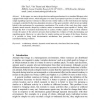Free Online Productivity Tools
i2Speak
i2Symbol
i2OCR
iTex2Img
iWeb2Print
iWeb2Shot
i2Type
iPdf2Split
iPdf2Merge
i2Bopomofo
i2Arabic
i2Style
i2Image
i2PDF
iLatex2Rtf
Sci2ools
114
click to vote
CONNECTION
2004
2004
'Feeling' the flow of time through sensorimotor co-ordination
In this paper, we aim to design decision-making mechanisms for a simulated Khepera robot equipped with simple sensors, which integrates over time its perceptual experience in order to initiate a simple signalling response. Contrary to other previous similar studies, in this work the decision-making is uniquely controlled by the time-dependent structures of the agent controller, which in turn are tightly linked to the mechanisms for sensorimotor coordination. The results of this work show that a single dynamic neural network, shaped by evolution, makes an autonomous agent capable of `feeling' time through the flow of sensations determined by its actions. Further analysis of the evolved solutions reveals the nature of the selective pressures that facilitate the evolution of fully discriminating and signalling agents. Moreover, we show that, by simply working on the nature of the fitness function, it is possible to bring forth discrimination mechanisms that generalize to conditions n...
| Added | 17 Dec 2010 |
| Updated | 17 Dec 2010 |
| Type | Journal |
| Year | 2004 |
| Where | CONNECTION |
| Authors | Elio Tuci, Vito Trianni, Marco Dorigo |
Comments (0)

